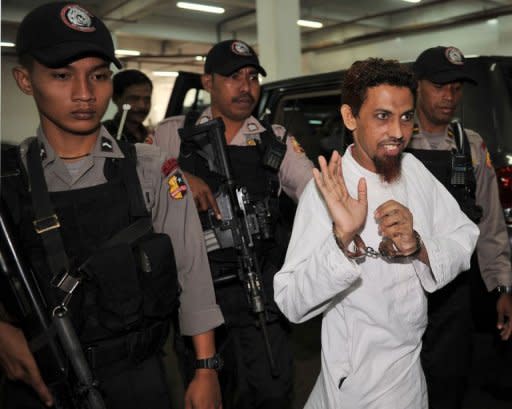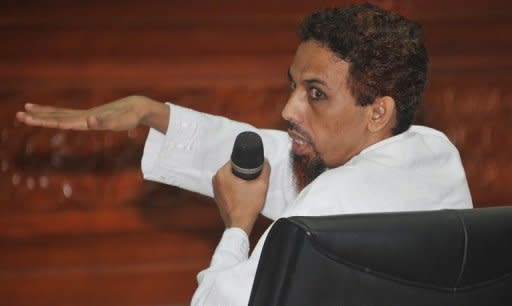Prosecutors seek life for Bali bombmaker
Indonesian prosecutors on Monday asked for a life sentence rather than the death penalty for Bali bombmaker Umar Patek, arguing that his remorse in the dock should spare him from a firing squad. Patek, 45, is accused of masterminding attacks on two nightclubs on the resort island in October 2002 which killed 202 people, including 88 Australians, and on churches in Jakarta on Christmas Eve 2000. When the trial started in February, prosecutors had said they would seek capital punishment for Patek, who was held last year in the Pakistani town of Abbottabad, four months before Al-Qaeda chief Osama bin Laden was killed there. Dubbed "Demolition Man" by local media for his bombmaking prowess, Patek is charged with premeditated murder. The West Jakarta District Court is expected to deliver its verdict on June 21. Prosecutor Bambang Suharyadi told the court that the case against Patek, the final key Bali suspect to stand trial, for premeditated murder had been shown without doubt. But he said they were seeking a lighter sentence because the defendant had been remorseful and cooperative. "We the prosecutors recommend... the defendant Umar Patek be given a life sentence," Suharyadi said. "He has been polite and cooperative during the trial and regretted what he has done." The prosecutor added that Patek "will remain in prison until he dies". Patek on Monday repeated an apology he made earlier this month to the relatives of those killed in the Bali and church attacks. "I regret what I have done... (and) I apologise to the families of victims who died -- Indonesians and foreigners," said Patek, who wore a matching long shirt and loose trousers. "I apologise also to victims who were injured." Terrorism expert Noor Huda Ismail said it was important that Patek remain alive because of the information he could still yield. "Patek is an encyclopedia of information on the who's who of Al-Qaeda in Southeast Asia," said Ismail, executive director of the Institute for International Peace Building in Jakarta. "Unlike the executed Bali bombers he showed remorse, meaning there's little chance he will try to plan future attacks from jail. He can also be used as a figure to speak out against terrorism," he said. Patek is accused of being the expert bombmaker for Jemaah Islamiyah (JI), a Southeast Asian terror network linked to Al-Qaeda. Three JI members -- Ali Ghufron (who went by the name Mukhlas), Amrozi bin Nurhasyim and Imam Samudra -- were executed by firing squad in November 2008 for their roles in the attacks. Patek denies he led the bombmaking team for the Bali attacks, confessing only to playing a minor role. He admitted to mixing the chemicals for the explosives, but said that he did not know how the bombs would be used. Patek allegedly used simple household tools including a rice ladle to assemble the Bali bombs, which according to the court indictment were housed in ordinary filing cabinets. He was arrested in Abbottabad in January last year. Evidence in the trial suggested bin Laden gave JI $30,000 to wage jihad in the region and Patek might have met him in the Pakistani town -- a claim he has repeatedly denied. Patek was once the most-wanted terror suspect in Indonesia and spent nearly a decade on the run, with the United States offering a $1 million bounty for his capture.



